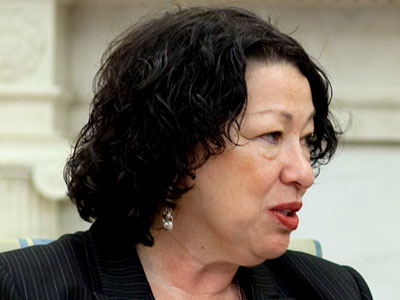
I don’t know about you, but I am getting a little tired of the drumbeat repetition of the “wise Latina” quote (which may be the point of inundating us with it: everyone is bound to soon say “Enough already! We heard it!”), so I decided to see what Sonia Sotomayor’s oft-quoted speech looked like in context. The address was delivered at a symposium held at Berkeley Law School in 2001, “Raising the Bar: Latino and Latina Presence in the Judiciary
and the Struggle for Representation.”This is scary stuff. Expressing agreement with the proposition that “there is no objective stance but only a series of perspectives–no neutrality, no escape from choice in judging,” she continues:
“I further accept that our experiences as women and people of color affect our decisions. The aspiration to impartiality is just that–it’s an aspiration because it denies the fact that we are by our experiences making different choices than others. Not all women or people of color, in all or some circumstances or indeed in any particular case or circumstance but enough people of color in enough cases, will make a difference in the process of judging [emphasis added].”
One wonders what will constitute “enough,” and just what “difference” she is seeking?
And, again:
“As recognized by legal scholars, whatever the reason, not one woman or person of color in any one position but as a group we will have an effect on the development of the law and on judging [emphasis added].”
I don’t know about her, but I’m about her age and I spent my 20s and 30s establishing myself in male-dominated businesses by working hard and achieving mastery. Somehow I don’t think that if only there had been more women working in those industries that the market would have functioned better.
Finally:
“There is always a danger embedded in relative morality, but* [emphasis added] since judging is a series of choices that we must make…”
*”but”??!! I infer that this is a danger she is willing to assume unto her “wise” self.
Which leads to perhaps the more salient question: Is she “wise”? Is she a Constitutional scholar? Does she know and appreciate that language has changed in the 220 years since the Constitution was ratified, and that what she as “a wise Latina woman with the richness of her experiences” may understand those words to mean in the 21st century may likely differ from what the framers of the Constitution meant? As just one small example, our book, The Founder’s Second Amendment, examines primary documents to conclusively show that these men, who had experienced first-hand the British army’s violent attempts to disarm the population as the most effective means of holding it subservient to the King, meant “the right of the people to keep and bear arms” as an individual right to keep (own) and bear (carry) arms (guns).
Given her own question: “I wonder whether by ignoring our differences as women or men of color we do a disservice both to the law and society,” leaves little doubt in my mind which she believes and would pursue.
Heaven save us from a world in which the highest court to which one can appeal is ruled by “justices” who do not believe in any “objective stance” or “impartiality.” One could not for a minute hope for “justice,” but only “mercy” doled out depending upon the “circumstance,” with the “choice” of rulings settled upon by the black-robed rulers on any given day.
Mary Theroux is Vice President at the Independent Institute in Oakland, California. The original version of this article was edited for length.

